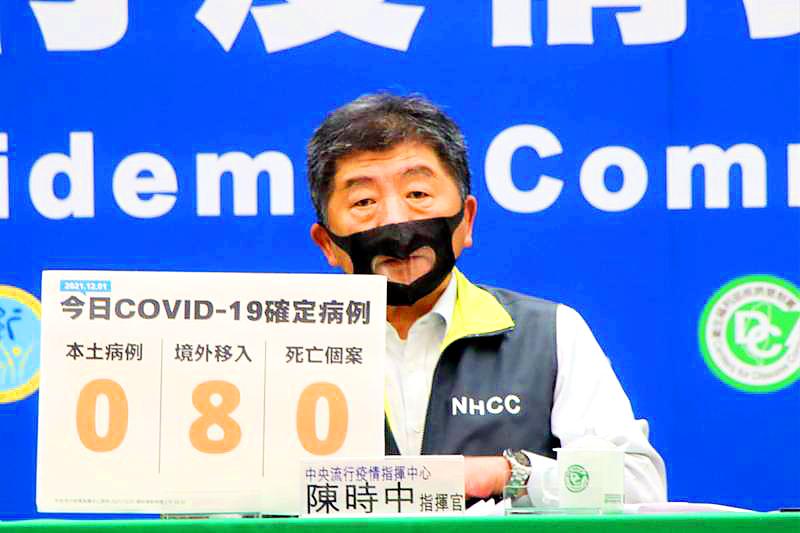Taiwanese who have been removed from household registration records due to the COVID-19 pandemic can re-enroll into the National Health Insurance (NHI) scheme upon returning to Taiwan without the normal six-month wait, the Central Epidemic Command Center (CECC) said yesterday.
Minister of Health and Welfare Chen Shih-chung (陳時中), who heads the center, said that the pandemic has made international travel more difficult, so the rights and interests of some overseas Taiwanese might have been harmed, as they could not return home.
Government agencies have made adjustments to regulations to reduce possible damage to the rights and interests of overseas Taiwanese, Chen said.

Photo courtesy of the Central Epidemic Command Center
Department of Social Insurance Director Shang Tung-fu (商東福) said that those who have been away from Taiwan for more than two years are removed from household registration and withdrawn from the NHI scheme, but measures have been put in place to protect their right to enroll with the NHI and the national pension scheme.
People who were enrolled with the NHI on Jan. 1 last year can apply to the NHI Administration to continue their enrollment from the day they were removed, Shang said.
People who have been delisted from the household registration and NHI since Jan. 1, 2018, but return to Taiwan between Jan. 1 last year and Dec. 31 next year, can re-enroll with the NHI immediately without having to wait six months, he said.
The eased rules are similar for the national pension, he said, adding that people who were enrolled on Jan. 1 last year should apply with the Labor Insurance Bureau to continue their enrollment.
People who lose their household registration between Jan. 1 last year and Dec. 31 next year, and were not able to stay in Taiwan for more than 183 days per year for the past three years can apply with the bureau to have their claims recognized, he said.
The Ministry of Finance’s Taxation Administration also announced eased rules for recognizing residency for people who were removed from their household registration due to travel difficulties caused by the pandemic, as residency affects individual income tax and land value tax.
Meanwhile, Chen said that as of yesterday, the nation’s first-dose vaccination rate had reached 77.93 percent, while the full vaccination rate reached 56.8 percent.
Centers for Disease Control Deputy Director-General Chuang Jen-hsiang (莊人祥), the CECC’s spokesman, said that there are still about 9.37 million COVID-19 vaccine doses in four brands available in Taiwan.
As there is now sufficient supply of vaccines in the nation, the CECC urges unvaccinated or partially vaccinated people to get fully vaccinated as soon as possible to reduce the risk of serious complications or death, Chen said.
Taiwan yesterday reported eight imported cases, with six among them vaccine breakthrough infections, the CECC said.

The US government has signed defense cooperation agreements with Japan and the Philippines to boost the deterrence capabilities of countries in the first island chain, a report by the National Security Bureau (NSB) showed. The main countries on the first island chain include the two nations and Taiwan. The bureau is to present the report at a meeting of the legislature’s Foreign Affairs and National Defense Committee tomorrow. The US military has deployed Typhon missile systems to Japan’s Yamaguchi Prefecture and Zambales province in the Philippines during their joint military exercises. It has also installed NMESIS anti-ship systems in Japan’s Okinawa

‘WIN-WIN’: The Philippines, and central and eastern European countries are important potential drone cooperation partners, Minister of Foreign Affairs Lin Chia-lung said Minister of Foreign Affairs Lin Chia-lung (林佳龍) in an interview published yesterday confirmed that there are joint ventures between Taiwan and Poland in the drone industry. Lin made the remark in an exclusive interview with the Chinese-language Liberty Times (the Taipei Times’ sister paper). The government-backed Taiwan Excellence Drone International Business Opportunities Alliance and the Polish Chamber of Unmanned Systems on Wednesday last week signed a memorandum of understanding in Poland to develop a “non-China” supply chain for drones and work together on key technologies. Asked if Taiwan prioritized Poland among central and eastern European countries in drone collaboration, Lin

ON ALERT: Taiwan’s partners would issue warnings if China attempted to use Interpol to target Taiwanese, and the global body has mechanisms to prevent it, an official said China has stationed two to four people specializing in Taiwan affairs at its embassies in several democratic countries to monitor and harass Taiwanese, actions that the host nations would not tolerate, National Security Bureau (NSB) Director-General Tsai Ming-yen (蔡明彥) said yesterday. Tsai made the comments at a meeting of the legislature’s Foreign Affairs and National Defense Committee, which asked him and Minister of National Defense Wellington Koo (顧立雄) to report on potential conflicts in the Taiwan Strait and military preparedness. Democratic Progressive Party (DPP) Legislator Michelle Lin (林楚茵) expressed concern that Beijing has posted personnel from China’s Taiwan Affairs Office to its

BACK TO WORK? Prosecutors said they are considering filing an appeal, while the Hsinchu City Government said it has applied for Ann Kao’s reinstatement as mayor The High Court yesterday found suspended Hsinchu mayor Ann Kao (高虹安) not guilty of embezzling assistant fees, reducing her sentence to six months in prison commutable to a fine from seven years and four months. The verdict acquitted Kao of the corruption charge, but found her guilty of causing a public official to commit document forgery. The High Prosecutors’ Office said it is reviewing the ruling and considering whether to file an appeal. The Taipei District Court in July last year sentenced Kao to seven years and four months in prison, along with a four-year deprivation of civil rights, for contravening the Anti-Corruption